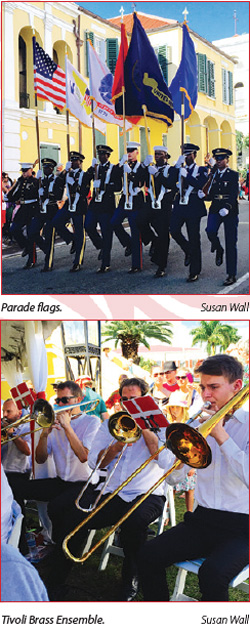

by Apple Gidley
It was a good day. An easterly breeze ruffled whitecaps offshore and flowery hats onshore as men, women and a smattering of children watched marching bands and majorettes parade past the bedecked dais filled with local and international worthies.
Expectation hovered. Said dignitaries made their way to a large marquee under which islanders, long-time residents, newbies like me, tourists and a contingent of Danish visitors wafted programs back and forth moving air along the rows.
Would Denmark apologize for past indignities? For the human tragedy of the transatlantic slave trade? Would the mainland listen to entreaties by islanders for full US citizenship allowed a vote in presidential elections?
Chatter along the lines was hopeful. Cheerful. Who doesn’t like a parade, the promise of promises – even if they are later unfulfilled, the anticipation of revelry, jazz and fireworks? Meanwhile steel pans from a local elementary school and the Copenhagen Brass Ensemble took turns in keeping the masses entertained.
A wreath was floated off the Boardwalk in memory of ancestors and, in particular, Alberta Viola Roberts, a girl taken from her family and transported to Copenhagen at the age of four to be displayed in the Tivoli Gardens – an oddity to be ogled. As fate would have it, she was buried in that cold and distant land on 31st March, 1917 – the day Denmark sold the Danish West Indies to the United States of America for 25 million dollars in gold.
The brass band struck up Der er et Yndigtland and voices from the Danish contingent proudly sang their national anthem as the dannebrog slid down Fort Christiansvaern’s flagpole to be replaced by the fluttering Stars and Stripes. Then came the Star Spangled Banner, followed by the Virgin Islands March, written by Alton Adams in 1920. The lyrics, All Hail the Virgin Islands, Em’ralds of the Sea, filtering around the tent in a swirl of pride, and hope.
An invocation, then opening remarks by Sonia Jacobs Dow who commented that islanders were citizens of nowhere from 1917 – 1927 when the newly-acquired islands were under naval administration. We were exhorted to remember “blood, sweat and tears are inextricably mixed in this soil” and that, “this celebration is more than a moment”.
 Each year, on Transfer Day, the proceedings are interspersed with a naturalization ceremony when new citizens swear allegiance to their new country. This year 20 men and women from eight countries became Americans to the sound of children’s laughter as they rolled down the slope from the fort – their frivolity lending an air of joyful abandon to the occasion. Further proof the US is founded on the willingness of foreigners to renounce their birth countries and apply their skills to enriching their new country.
Each year, on Transfer Day, the proceedings are interspersed with a naturalization ceremony when new citizens swear allegiance to their new country. This year 20 men and women from eight countries became Americans to the sound of children’s laughter as they rolled down the slope from the fort – their frivolity lending an air of joyful abandon to the occasion. Further proof the US is founded on the willingness of foreigners to renounce their birth countries and apply their skills to enriching their new country.
After the temporary court was adjourned, politicians returned to the lectern. The Honorable Stacey E. Plaskett carried on the theme of disenfranchisement, commenting that whilst the purchase of the Danish West Indies was the most costly land purchase in US history, no providence was made for the islanders in the document – ensuring they became essentially “a marooned people.”
Then came the speech of the day – spoken eloquently in a language not his own – by the Danish Prime Minister, The Honorable Lars Løkke Rasmussen. He began by saying a special bond of friendship existed between the Virgin Islands and Denmark, “a touch of common destiny that time cannot erase.”
While not apologizing for bygone atrocities, Prime Minister Rasmussen did acknowledge them saying, “There is no justification for the exploitation of men, women and children under the Danish flag.” He said the term ‘dreamer,’ as David Hamilton Jackson was called by a Danish governor, was in all likelihood meant as an insult, but that in today’s world it would considered an honor. We were reminded, “We must acknowledge what happened in the past but we can’t undo the past – what we can do is look to the future.”
It was a smooth transition to the announcement of a 5-year scholarship program to be given at the University of the Virgin Islands. It is students who “must take destiny into their own hands,” Rasmussen said.
The Prime Minister’s words were in stark contrast, both in content and delivery, to those uttered by the senior US representative, Secretary of The Interior Ryan Zinke. His speech was brief and uninformative as was the letter he read from President Trump, which gave little credence to the concerns of Virgin Islanders – that of full-voting rights for citizens, amongst other things. The USVI, America’s Caribbean, was offered little of hope for improvement.
Kenneth E Mapp, Governor of the Virgin Islands, rounded out the official celebrations by commenting that, “Living in the past has little value on our future. But knowing our past is important to our future.”
Black limousines drove dignitaries away – the program to be repeated on St Thomas at 2pm. Meanwhile on St Croix the crowds dispersed along the Boardwalk, back to cars parked haphazardly on our street, or to local watering holes. To reconvene as the sun set in a tickle of pink and mauve over masts bobbing in Christiansted Harbor, and the sounds of Eddie Russell and his jazz band.
And then the boom, the hiss, the thrill of the sky dissolving in a shower of sparkling colors as fireworks saluted 100 years of being American!

A transient life has seen Apple Gidley live in countries as diverse as Papua New Guinea and Thailand, or Equatorial Guinea and the USA, and another eight in between. Her memoir, Expat Life Slice by Slice, tells of the highs and lows of that nomadic life. She currently divides her time between Houston, Texas and St Croix, USVI.
Her travel articles are filled with color, and spiced with subtleties that take the arm-chairtraveller to that country, or make the experienced traveller add it to their list. She draws on her experiences for her pieces on expatriate living, which offer down-to-earth observations and encouragement to those about to embark on the trail, or who already live the life.
Gidley writes a regular blog at www.applegidley.wordpress.com. Her debut novel, “Fireburn”, set in the 1870s Danish West Indies, is due to be released on 1st October, 2017.
